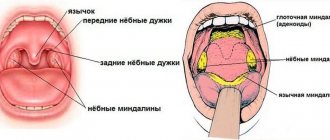Causes of sore throat
The most common cause of acute tonsillitis is the proliferation of streptococcal flora in the mouth.
Depending on the etiology of the causative agent, sore throat may be:
- Bacterial. In this case, streptococci, staphylococci, and pneumococci become the source of infection.
- Viral. This form of the disease goes away in a short period of time and with less severe symptoms. The causative agent can be adenovirus, herpes and influenza viruses.
- Gribkova. Often occurs during treatment with antibiotics as a result of the proliferation of fungus of the genus Candida.
The appearance of sore throat can be caused by the activation of bacteria that are normally found in the oral cavity, but do not have a pathogenic effect. The influence of predisposing factors activates opportunistic microflora:
- hypothermia causes a decrease in the activity of the body's defenses, which creates favorable conditions for the proliferation of microbes;
- hypovitaminosis;
- diseases of the gastrointestinal tract lead to decreased absorption of nutrients and a lack of essential microelements and vitamins;
- tobacco smoke when smoking has a detrimental effect on the tonsils;
- alcohol abuse causes a decrease in the overall reactivity of the body;
- poor nutrition low in vitamins and minerals impairs the functioning of the entire body;
- Chronic inflammation in the nasal cavity and paranasal sinuses can lead to the spread of microbes into the oral cavity.
Separately, tonsillitis is isolated from infectious mononucleosis, its etiology is not fully understood. It is believed that the cause is the influence of viruses or bacteria against the background of changes in the state of immunity.
Treatment
Treatment of sore throat is the responsibility of a therapist; you should contact him at the first suspicion of this disease, and in no case should you self-medicate. Different types of sore throat require different approaches to treatment; there is no universal cure. Many unqualified doctors for any throat disease, even mild sore throat, prescribe antibiotics to the patient, despite the fact that frequent use of these drugs leads to resistance and causes great harm to the body.
If the process is chronic, doctors suggest solving the problem radically by removing the tonsils. However, these approaches are incorrect, since an experienced specialist must first examine the patient and select a competent treatment regimen for him, trying in every possible way to avoid surgical intervention. You should turn to antibiotics as a last resort and only as prescribed by a doctor, because their prolonged and frequent use leads to a decrease in immunity. Also, many throat diseases are caused not by bacteria, but by viruses, against which antibiotics are powerless. Tonsils or tonsils should be removed only as a last resort, when the inflammation is very severe and no other treatment methods help. After all, the tonsils are the body’s protective gates, protecting it from any infections. Also, immune cells are produced in the tonsils; without them, immunity decreases and, if they are removed, the chances of contracting a particular infection increase. After such an operation, you can get quite serious problems with the heart and kidneys, and various allergic diseases can develop. Instead, the doctor may prescribe the use of Iodinol. This drug has a low cost in pharmacies and is much more effective than many expensive medications. With its help, it is recommended to prepare a solution with which to gargle regularly. But “Iodinol” has contraindications due to the fact that it affects the thyroid gland, therefore it is not suitable for autoimmune thyroiditis, pregnant women and nursing mothers. In this case, you can use inexpensive antiseptics such as Chlorhexidine and Miramistin. To treat tonsillitis, they also use a relatively inexpensive and very effective device for home use - a quartz ultraviolet irradiator with special throat attachments.
An important contribution to treatment is increasing immunity and drinking enough fluids. It is recommended to remove sweets and sugary, carbonated drinks from the diet, as sugar is a breeding ground for the development of microorganisms. In case of chronic illness, you should check the health of your teeth, because throat diseases often occur against the background of the fact that there is an infection in the oral cavity.
Classification of sore throat
In a broad sense, angina is the inflammation of all the lymphoid elements of the pharyngeal ring: nasopharyngeal, tubal, lingual and palatine tonsils. But in most cases this is called acute tonsillitis.
Depending on the location of the lesion, sore throat can be:
- Laryngeal;
- Side rollers;
- Palatine and nasopharyngeal tonsils (adenoiditis);
- Lingual tonsil.
There are several types of disease, which are divided according to various criteria. If tonsillitis occurs as an independent disease, then it is primary tonsillitis. And if against the background of other diseases - secondary, or symptomatic.
According to the nature of local changes during examination of the oropharynx, sore throat is divided into the following types:
- Catarrhal. In this case, mild symptoms of intoxication are observed: weakness, increased fatigue, elevated temperature, pain when swallowing and a feeling of discomfort in the oral cavity. The tonsils are hyperemic and enlarged, but there is no plaque on them, regional lymph nodes are enlarged to 1 cm.
- Follicular. A plaque in the form of white dots appears on the tonsils, which indicates that the follicles are filled with pus. Temperature 38-39°C, acute pain in the throat. Lymph nodes are enlarged to 2 cm and are painful when palpated.
- Lacunarnaya. Plaque areas spread and are found at the level of the mouths of the lacunae in the form of white or gray islands. The symptomatic picture is the same as for follicular.
- Phlegmonous. The tonsil is sharply swollen due to a cavity filled with pus.
According to severity, acute tonsillitis is divided into 3 types:
- Mild, corresponds to the catarrhal form and occurs with symptoms of intoxication and mild sore throat.
- The average degree is observed in follicular and lacunar tonsillitis and is accompanied by severe sore throat and severe symptoms of intoxication.
- Severe is observed with phlegmonous and advanced lacunar form. In this case, the temperature rises to 39°C and lasts for a week, the lymph nodes are very painful.
There is a special form of the disease, Simanovsky-Plaut-Vincent angina, which develops against the background of severe suppression of the immune system and activation of microorganisms that are part of the normal microflora of the oral cavity.
According to the etiology, sore throat is:
- bacteriological;
- viral;
- fungal;
- parasitic.
All forms of the disease are accompanied by various local clinical symptoms.
Hexoral® spray for sore throat - get treatment now!
The information in this article is for reference only and does not replace professional advice from a doctor. To make a diagnosis and prescribe treatment, consult a qualified specialist.
- "Sore throats: diagnosis and treatment." L.N. Kunelskaya, A.B. Turovsky, Yu.S. Kudryavtseva/Moscow Scientific and Practical Center of Otolaryngology/General Medicine 3.2010/Art. 4-8.
- “Sore throat” Head of the Department of Otolaryngology – I.B. Soldatov, professor N.S. Khrappo / Moscow, 1998 / art. 1-2.
- “Sore throats” by M.T. Galchenko, M.V. Subbotina/textbook/Department of Otolaryngology/Ministry of Health/Irkutsk 2008/ Art. 38.
- V.F. Undritz, K.L. Khilov, N.N. Lozanov, V.K. Suprunov “Diseases of the ear, nose and throat” (a guide for doctors). Publishing house "Medicine", 1969. Designed and republished by Alexey Kuimov in 2003./Acute (vulgar) banal sore throats Art. 465-467.
- “Sore throat in the practice of a local therapist”: method. recommendations / E.V. Yakovleva, R.V. Khursa. – Minsk: BSMU, 2009./art.2–6.
- “Lectures on otolaryngology” - Otolaryngology / 1990 I.B. Soldatov / p. 187.
- “Principles of etiopathogenetic therapy of acute pharyngitis” / Methodological recommendations / S.V. Ryazantsev/St. Petersburg 2013 p.34-36.
come back
Up to contents
Symptoms of a sore throat
The appearance of characteristic symptoms of acute tonsillitis is observed already 10 hours after the onset of infection. At the beginning of the disease, you may experience a sore throat and a feeling of dryness in the throat and joint pain.
A sore throat can be suspected when general symptoms of the disease appear. These include:
- malaise, weakness;
- decreased performance;
- loss of appetite;
- temperature rise to 38-39°C;
- nausea, vomiting;
- sleep disturbance.
The main signs of the development of sore throat in other diseases:
- With influenza, tonsillitis is often associated with inflammation of the nasal membrane and conjunctiva of the eyes.
- With scarlet fever, a pinpoint rash and peeling are observed, especially pronounced in the area of the nasolabial triangle. Symptoms include high fever, vomiting and plaque on the tonsils.
- The catarrhal form occurs against the background of low-grade fever and pain when swallowing. Lasts 2 days, after which it becomes follicular.
- Follicular and lacunar tonsillitis are accompanied by similar symptoms, but in the second form they are more pronounced. The temperature rises to 39°C, there is a very strong and sharp pain in the throat, which can radiate to the ear, and salivation increases.
- Herpetic sore throat is accompanied by a rash on the tonsils in the form of blisters, a sore throat and indigestion.
- With diphtheria, as the film spreads, difficulty breathing occurs, shortness of breath up to the development of respiratory failure.
The most severe symptoms are observed on the 2nd day of illness, on average the duration of the disease is about a week.
Other types of sore throats
As mentioned above, sore throat can occur not only in the tonsils. In children, a common form of the disease is adenoiditis - inflammation of the nasopharyngeal tonsil. Chronic inflammation leads to the proliferation of connective tissue and an increase in lymphoid elements in size. This causes difficulty in nasal breathing in children; nasal sound and hearing loss may occur. Lack of treatment leads to the development of the adenoid type of the facial skeleton in children.
Sore throat in infectious mononucleosis is accompanied by high temperature and fever, the lymph nodes are enlarged and painful.
Necrotizing tonsillitis is characterized by the formation of ulcers and areas of death of lymphoid tissue on the surface of the tonsil. This provokes the gradual destruction of the palatine tonsils. This form is typical for individuals with a suppressed immune system.
Parasitic tonsillitis develops with the penetration of amoebas. Such people exhibit characteristic clinical symptoms for inflammation of the tonsils, and the diagnosis is made on the basis of bacteriological culture and detection of amoebas.
What causes the disease
In adults, in most cases (from 50 to 80%) sore throats are caused by viruses. And in children, bacterial sore throats are more common. They are more severe and often lead to complications. It's all about a harmful microorganism called "group A beta-hemolytic streptococcus." When it “sticks” to the tonsils and interacts with the lymphoid tissue, a new substance is formed, the structure of which is similar to our own tissue. The body understands that something foreign has entered it and needs to be dealt with. But in the end, it produces antibodies against its own tissues, which are similar to the structures that appeared as a result of the activity of the microbe. It kind of confuses them. That is why, as a result, not only the throat suffers, but also the joints, heart, kidneys and other organs and systems. Therefore, angina is considered a general disease with a predominant lesion of the palatine tonsils. And if hospitalization is necessary, a patient with a sore throat is sent to the infectious diseases department, not the ENT department of the hospital.
Possible complications
All complications of angina are divided into two groups: early and late.
Early (purulent) complications include:
- swelling of the larynx;
- inflammation of the paranasal sinuses;
- inflammation of the laryngeal mucosa;
- peritonsillar abscess;
- phlegmon of the neck;
- inflammation in various parts of the ear;
- inflammation of the cervical lymph nodes.
Late complications develop in individuals with high sensitivity of kidney and heart tissue to streptococcus. Among these:
- Poststreptococcal glomerulonephritis is the formation of cells against the kidney’s own tissues due to infection. The disease occurs 2 weeks after a sore throat. This causes swelling and increased blood pressure. Treatment ensures complete recovery.
- Acute rheumatic fever - damage to connective tissue due to infection with streptococcus. Accompanied by joint pain and fever. The danger of the disease is that it is possible to develop heart valve defects.
Timely treatment and diagnosis of tonsillitis will eliminate the development of complications.
Don't give illness a chance
The worst thing about a sore throat is complications. It serves as a trigger for the development of not only chronic joint diseases, but also kidney diseases and myocarditis. The heart suffers the most with frequent repeated sore throats. Untreated tonsillitis can cause chronic tonsillitis. In this disease, lymphoid tissue is replaced by connective tissue, which is why the tonsils cease to perform their protective function. By the way, tonsillitis is often confused with sore throat, but this is not the same thing. Sometimes people ask: what are frequent sore throats? Having a sore throat about once every 2 years is within the normal range, but if it happens twice a year or more often, doctors talk about repeated, frequent sore throats. Then other means are used: washing the tonsils, irrigation with medications. If therapeutic treatment is ineffective, they resort to tonsillectomy - removal of the tonsils. But the operation provides a 100% guarantee only in relation to tonsillitis, and the inflammatory process with angina, as we have already said, can also occur in the area of the larynx, palatine (pharyngeal) ridges, and adenoids.
The only universal remedy against sore throat, even if it does not seem trivial, remains hardening. Walking through the autumn forest, wet rubdowns, douches, contrast showers, cool foot baths - all these are simple but effective ways to boost immunity. In this case, two factors are very important - gradualism and constancy.
Diagnosis of sore throat
The diagnosis is made based on characteristic clinical symptoms, results of thermometry, pharyngoscopy and palpation of regional lymph nodes. To exclude diphtheria, a swab is taken from the discharge of the nose and tonsils.
Pharyngoscopy reveals:
- hyperemia of the palatine arches and tonsils;
- absence or presence of film and plaque on lymphoid formations;
- enlarged tonsils;
- with herpetic origin of the disease, rashes in the form of blisters are observed.
A smear allows you to determine the etiology of the disease. At the Otradnoe Polyclinic, a rapid test is performed, which makes it possible to establish a diagnosis within 10 minutes. We also use a technique for determining the sensitivity of a microorganism to an antibiotic, which makes it possible to accurately prescribe and fully control treatment.
A clinical blood test for this disease is not very informative. Only with mononucleosis are characteristic changes observed: an increase in the level of monocytes and lymphocytes. With other types of sore throat, signs of inflammation may be observed: an increase in the number of leukocytes and ESR.
If a picture of rheumatic fever occurs, an echocardiogram will be required, which shows the condition of the heart valves. If joint damage is suspected, x-rays of bones and joints are performed.







